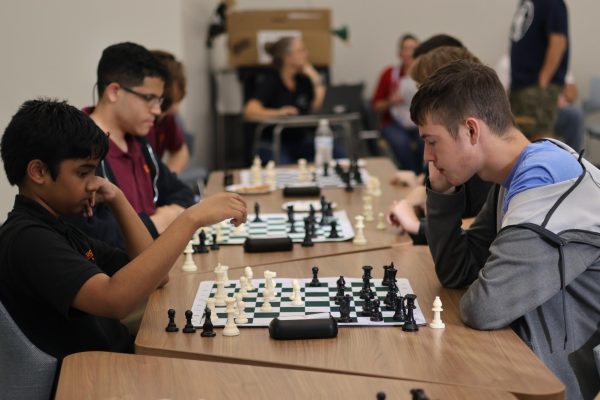Stocking the market
Students and staff alike take a gamble on the economy.
photo by Gabriella Herrera
Though the stock market has been considered a boring topic by many, the recent GameStop “boom” caused increased nation interest in learning the basics of economics.
“Ten-year-old makes $3200”
“Meme cryptocurrency Dogecoin worth millions”
“Young investor pays off student loans at just 20 years old.”
These headlines have become familiar as the success stories featuring regular people have incentivized many to take the plunge and begin investing.
Due to the pandemic causing record lows for some high-value stocks and the ease of stock trading thanks to the free or low-cost apps, people like senior Steven Shu have started investing in the stock market game. For the past year, Shu has kept an eye out for opportunities like the low-price turned high-value tech stocks he acquired last March.
“It was mostly learning on the go — an accumulation of experiences,” Shu said. “If I saw something that I didn’t understand, I would just Google that term or concept and read up on it.”
Websites like Investopedia, The Balance and NerdWallet are all places beginners use to acquire more information on the basics of the stock market, before moving to expert sites like The Wall Street Journal.
Still, investing brings financial risk. Even for those with more knowledge, there is no guarantee that a decision will be the correct one. Predictions about how the market will change are just that — predictions. Stock values can change at any time, for any reason, making it a risky situation for any investor. For Shu, making some mistakes was part of the process.
“When I first tried to transfer the money from my bank to my stock account, I put the wrong account number which had $0 and my bank charged me $75 for insufficient funds,” Shu said. “It delayed me a couple of days from buying the shares I was looking at, and by the time I got it sorted the stock price had gone up over $100. I bought it anyway.”
This setback serves as a testament to how careful new investors, who have yet to master the market, have to be. Despite the challenge, Shu is far from the only student to have recently taken up investing. Junior Olivia Martin is also a beginner in the stock market, but her motivations were more family-motivated than Shu’s.
“ My grandma put some in for me,” Martin said. “I’m only starting out in the stock market. It’s definitely fascinating.”
Family-encouraged investment is a trend becoming increasingly more common. While in the past children received gift cards to purchase what they wish on their birthdays, now they might get $100 to play the stock market game. While technically financial accounts have to be run by adults age 18 and over, giving youth hands-on experience with buying and trading stock might help this generation come to a more complex understanding of economics than ever seen before.
However, despite the stock market’s increasing accessibility, many criticize its fundamental flaws that prevent billion dollar success for the lower classes. Senior Alex Tao knows the system is discriminatory, making it much more difficult for regular people like him to invest.
“The stock market is a system set up by the upper class to keep the middle and lower classes in their ‘proper’ places. I have a problem with that,” Tao said.
While there are a variety of systems in place to ensure the success of the wealthy, perhaps none are so obvious as hedge funds, investment pools for well-off investors run by a professional manager, working to minimize risk while maximizing reward. The existence of these funds in itself is a great controversy, perhaps even more so in the way they bet against the success of businesses.
Economics teacher Adam Stansbury can understand volatile and often unfair effects of the stock market. Twenty years ago, he found himself drawn in after an economic catastrophe.
“A lot of people lost a lot of money. They were doing day trading back then and when the dot-com crisis happened and all of a sudden all these people were losing money like crazy. I lost $3000 in one day on Microsoft stock,” Stansbury said.
Stansbury references the dot-com crisis, when internet-based companies blew up in the late ‘90s before eventually failing with the turn of the century. Everyone who had been invested had a significant portion of their investment, impacting the entire country.
Outside of losing on Microsoft stock, Stansbury became more committed to his stock market investments. Now, he urges students to understand the complexity of the stock market so they can best avoid the more unfair practices.
“For years I have wanted to do the stock market game,” Stansbury said. “People end up making their own money and putting in their real money, and then they lose money and they get all upset… it’s a gamble. They have to be careful.”
Can’t stop, won’t stop, GameStop
As part of the way wealthy investors secure maximized profits in hedge funds involves betting against the success of companies, generally struggling ones like GameStop, which had been declining in value for the later part of the decade.
GameStop’s wild stock fluctuation epitomized the trend of young stock investors when, at the end of January, in direct opposition to the hedge fund managers, investors following the subreddit r/WallStreetBets grouped together to purchase cheap GameStop stock as a way to “get back” at the hedge funds betting against it. Within hours, hedge fund millionaires went from preying on GameStop’s downfall to desperately scrambling to stop Reddit investors from driving its price up.
“I knew it was going to be a fad type thing. Is it good that it happened? I’m undecided,” Stansbury said. “Nobody should be betting against any business and that’s what the big hedge funds were doing… but then if we continue that process we end up having housing market crashes.”
Based on his background, Stansbury looks at young people investing with concern. However, Modeling and Simulation teacher Jonah Hardy looks at the investments with support and excitement for what this could mean from their generation.
“I think the GameStop situation was a powerful movement for young people,” Hardy said. “I believe that it brought the market to the forefront and got many people to start investing. I ended up buying some shares of GameStop early on and sold them for a profit.”
Regardless of the risk, having investments like this can often result in rewards. However, this successful investment depends on how the individual evaluates the market to best suit their interests. Hardy viewed the GameStop investment as a unique opportunity for him to quickly buy and sell stock for additional income.
Encouraged by the group environment and increased free time, young people from all across the country gather online to form discussions surrounding the stock market on online platforms like r/WallStreetBets. Though not an active user, Shu joined the subreddit when he first began investing. He found the now infamous forum to have “wild” culture, represented by its debates on future moves and the occasional market-related meme (it’s a subreddit, after all). Shu notes he recalled seeing GME (GameStop) at $20 a share, but dismissed it at first glance.
“Lots of people have lost a ton of money by jumping on the bandwagon just as others have made it rich. I don’t regret not participating since it was a gamble and I easily could’ve plummeted,” Shu said.
For now, it is unclear what the long-term effects of the GameStop debacle will be. The power small investors could have when joined together against traditional large fund investors could continue to be a battle that reshapes investment markets. Shu, along with the rest of the world, waits earnestly to see what happens next.
“I think it’s quite amusing how a bunch of Redditors were able to troll these billion-dollar hedge funds out of so much money. I’m just watching to see what’s going to happen in the future,” Shu said.
Your donation will support the student journalists of Hagerty High School. Your contribution helps us publish six issues of the BluePrint and cover our annual website hosting costs. Thank you so much!








